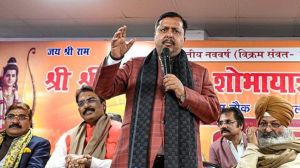Leading from the shadows
WHEN the bodies of three Dimasa tribals were found last month in a village inhabited primarily by the Karbi tribe, the police simply called ...

WHEN the bodies of three Dimasa tribals were found last month in a village inhabited primarily by the Karbi tribe, the police simply called it a dacoity. But the events that followed were much complex.
The killing sparked off more killings. Since then the Karbi Anglong Hill district, one of the two hill districts of Assam, has been on fire. Over 75 people, majority of them Karbis, have been killed while over 1,000 houses of both communities have been burnt down. Nearly 28,000 persons are living in 47 relief camps across the 10,434-sq km district.
In the midst of the violence if anything has survived it is the politics of opportunism. Various political parties as well as the two armed groups claiming to be saviours of the Karbi and Dimasa tribes respectively, have begun blaming each other for the ethnic strife. A strife which began years ago.
IN November 1951, a new district, the United Mikir and North Cachar Hills, was carved out of portions of Sibsagar, Nagaon, Cachar and United Khasi 038; Jaintia Hills. In 1970, it was again split up into two: the Mikir Hills district and the North Cachar Hills district. In 1976, the Mikir Hills district was rechristened Karbi Anglong.
While Karbi Anglong is dominated by the Karbi tribe, North Cachar is dominated by the Dimasas. But over 40,000 Dimasas live in Karbi Anglong. The two districts together constitute the Diphu-Autonomous Lok Sabha constituency, and both districts are autonomous districts under the Sixth Schedule of the Indian Constitution. Karbi Anglong incidentally is Assam8217;s largest district in terms of geographical spread.
TILL the late Nineties the Karbis and Dimasas lived in peace. Then came the shadow of militancy. It was followed by the birth of the United People8217;s Democratic Solidarity UPDS8212;a group that claims to be the messiah of the Karbi tribals and the Dima Halam Daoga DHD8212;which wants a separate state called Dimaraji exclusively for the Dimasa tribals. It claims the entire North Cachar Hills, portions of Karbi Anglong, and even Dimapur in Nagaland for its new state.
That was the beginning of a cleft between the two tribes, one which was exploited by politicians.
Initially, the NSCN IM supported the DHD but backed out after it found that the two hill districts of Assam also figured within the 8216;Greater Nagalim8217; that the Naga group stakes a claim to.
KARBI Anglong historically belongs to the Dimasas. Our ancestors ruled over Dimapur, the present Karbi Anglong hills and NC Hills and even a large portion of the Cachar district in the Barak Valley,8217;8217; says Dilip Nunisa, chairman of the DHD, which declared a ceasefire with the government in December 23, 2002.
The UPDS, which too had signed a ceasefire agreement with the government on May 23, 2002, has been demanding the DHD camp be removed from their district. And, even as tension was brewing between the two groups, it was the September 26 murders that brought out it out into the open.
8216;8216;While the government failed to anticipate trouble and adopted a laid-back attitude, different forces looking for a opportunity, simply stepped in,8217;8217; says Holiram Terang, a veteran Karbi MLA and leader of the Autonomous State Demand Committee ASDC, a political party that has both Karbis as well as Dimasas. Terang blames the Congress government for not reacting promptly, but refuses to name any group for the violence.
Meanwhile, the government appears to be convinced that the two militant groups are directly involved in the violence. Chief minister Tarun Gogoi summoned leaders of both the DHD and UPDS to Guwahati last Tuesday. Union home secretary Rajiv Agarwal too has said both groups had violated the ceasefire ground rules.
But those are government versions. Politics is different. The Assam Assembly elections are hardly six months away. 8216;8216;The Congress government is also to be blamed. It is trying to distract attention of the people from its misdeeds and failures,8217;8217; says AGP president Brindaban Goswami.
The BJP too has made a similar allegation. 8216;8216;Tarun Gogoi is trying to shift the focus from the Muslims8217; withdrawal of support to the Congress and his government8217;s failures,8217;8217; says SS Ahluwalia, BJP leader in charge of Assam.
- 01
- 02
- 03
- 04
- 05































